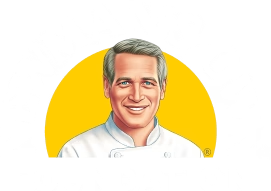“We really have to focus on how traditional foods can heal us, reconnecting us to the physical and spiritual connection to our ancestral territories.”
Nicole Lim, executive director
CIMCC
By Alastair Lee Bitsóí (Diné)
Acorns, the squirrel’s favorite meal, are a nutrient-dense superfood. High in iron, magnesium, potassium, vitamins A, E, and B6, not to mention healthy unsaturated fats, when prepared the correct way, they’re also edible, delicious even. In California, Tribal Youth Ambassadors at the California Indian Museum and Cultural Center (CIMCC), a Newman’s Own Foundation grantee partner, have created a tasty and nutritious snack from these nuts called Acorn Bites.
The youth ambassadors source nuts from Indigenous vendors, who rely on their cultural knowledge of harvesting the acorns and transform them into a protein-packed ball with other nutrient-dense foods. These include a mixture of corn, berries, and nuts.
The idea was born from a casual conversation, according to former Tribal Youth Ambassador Jayden Lim. “We were all sitting in a room having lunch together, and my mom goes, ‘Why don’t you kids eat traditional foods?’ My cousin Sebastian raised his hand, ‘Well, what if we made a protein bar?’”
For many Native youth, centuries of destructive practices supporting acculturation, or the assimilation to Western European food culture, have separated them from their histories and food traditions. Many healthful and traditional Native foods—such as acorns in California—are not even recognized by state governments as legitimate food sources. These harmful interventions severed ancestral knowledge, resulting in nutrition insecurity and chronic lifestyle illnesses in higher proportions than the rest of society.
“We really have to focus on how traditional foods can heal us, not only our bodies, through nutrition, but also reconnecting us to the physical and spiritual connection to our ancestral territories,” explained Nicole Lim, CIMCC’s executive director. Lim also manages the Tribal Youth Ambassadors Program, which serves up to 20 Pomo and Miwok youth through its programming and works with children in Indigenous communities to create solutions to nutrition insecurity and promote rematriation of food systems.
Through CIMCC’s Tribal Youth Ambassadors Program, Native youth have the support and platform to create social enterprises like Acorn Bites. “They’re delicious, nutritious and Indigenous,” says Lim. Through the values of rematriation—based on the teachings of Indigenous women—the youth learn to live in balance by using ancestral knowledge to overcome the current world of monoculture food production. While acorns are known as a food source for Native communities in California, they are not listed as an ingredient in the state, Lim said. This is where the Tribal Youth Ambassadors program comes in, challenging and shifting the food access narrative by making Native foods part of their recipe.
Building knowledge and skills
The process of reclaiming food traditions helps Tribal Youth Ambassadors think about solutions from within their own communities and ancestral knowledge. They source traditional ecological knowledge from the land and elders to enable them and their families to lead healthier lives, such as managing a diabetes diagnosis or, better yet, preventing the diagnosis in the first place. To achieve this, Native youth are looking within and peeling back layers of colonization to learn what their ancestors ate. Knowing that their bodies are attuned to eating specific foods from the natural environment, the youth ambassadors are becoming food entrepreneurs to learn more about their cultural identities.
“It’s brought up a lot of issues around access, and how we integrate traditional foods more as part of our daily lives rather than something that’s just a celebration or a ceremony and working towards doing research around nutrition and doing policy advocacy,” says Lim.
In the process, the youth are also learning how to build a small business. They have an online shop and also sell their product at local farmers markets and at the California Indian Museum and Cultural Center.
Most of the youth program’s Acorn Bites grant funds go toward projects like food research, partnering with acorn vendors, and even using the funds as stipends for Pomo and Miwok youth to promote their product.  A ripple effect
A ripple effect
With at least 109 federally recognized tribes in the state and an additional 80 tribes seeking federal recognition, California consists of a diverse range of Indigenous cultural foods, values and frameworks. The Tribal Youth Ambassadors group advocates for tribal communities and culture throughout California by taking up space and reclaiming its history with Indigenous foods through food sovereignty. Food sovereignty and Indigenous agriculture training with other Native tribes and food programs are part of the goals of the Acorn Bites program. In addition, adds Jayden Lim, the former youth ambassador, “I would love to see Acorn Bites on the shelf of a grocery store. That’s my dream.”
Reestablishing traditional food systems, which are beneficial to Indigenous peoples health and the environment, can help heal and prevent destructive monoculture agricultural practices harmful to both human health and the planet.
“We consider food sovereignty a lifelong learning process,” Lim said.How to Support CIMCC and Acorn Bites
Visit and donate to the CIMCC, and order Acorn Bites on their website.

